Egan wrote so. Danged. Much. Even more impressive: his scope.
Did he write sweeping, this-changes-everything ideas? Yes.
Works of history? Yup.
Scholarly monographs that sell for like a billion dollars, and somehow I own two of them? Check…
Collections of essays explaining why we like talking rabbits? I mean, don’t we all?
Collections of award-winning poetry? Double - check.
A murder mystery novel? Why, a little bit, yes!
The biggest problem in reading Egan is simple, where to begin?
A great place not to start
For my entry into the annual Astral Codex Ten book review contest, I picked Egan’s book, The Educated Mind (1997). And, frankly, I don’t recommend that anyone start with that book.
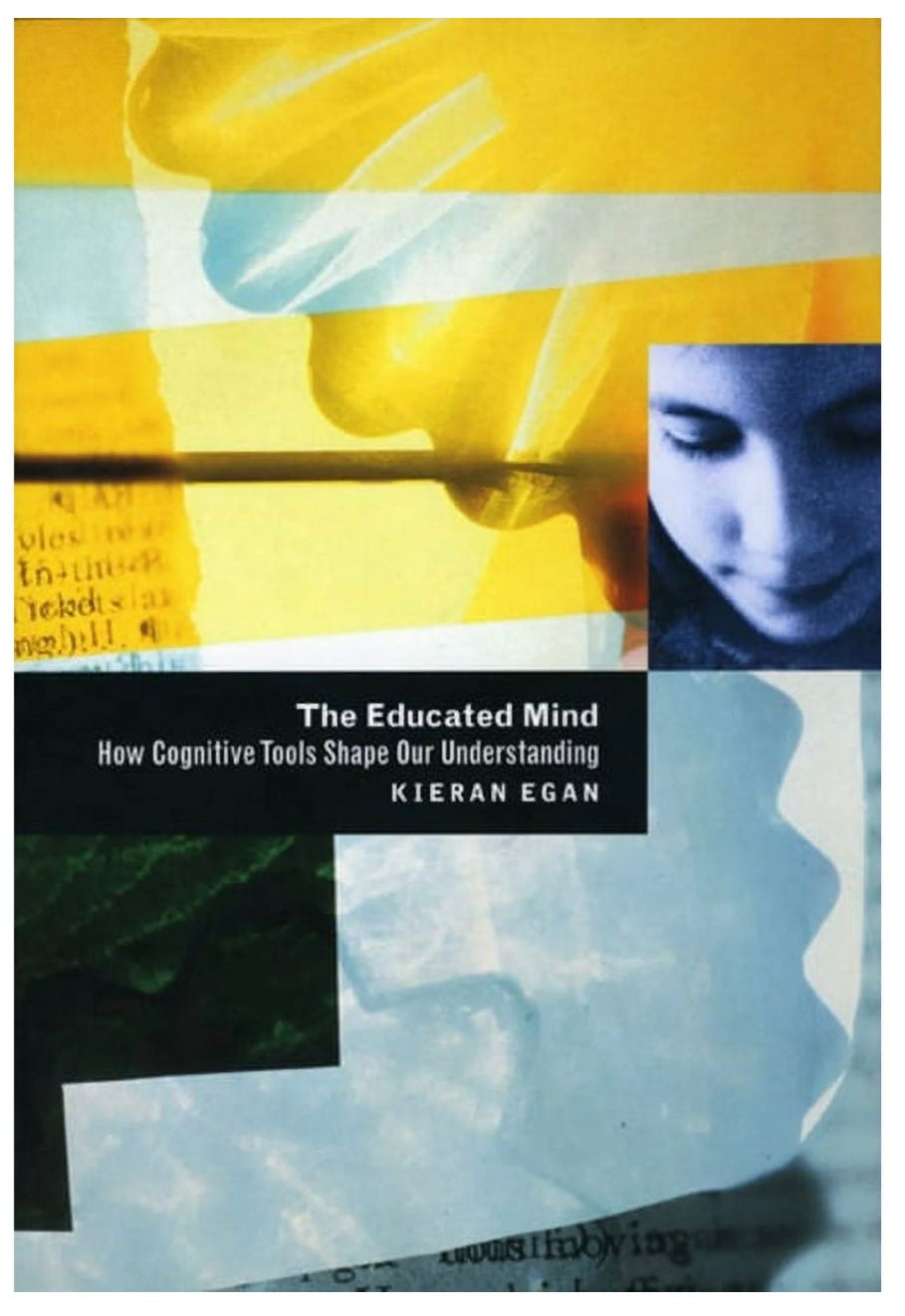
Why not? It’s long. It’s dense. It’s high-concept. And, it sort of… assumes you already understand 19th and 20th century philosophy, anthropology, and psychology? (While I was writing the review, a friend suggested that I was Eganize-ing Egan. This seems somewhat fair.)
It was written for a certain kind of scholar, and, for them, it presumably is a fine wine. But if you’re not a scholar, and still found the book review interesting, there’s a lot of Egan’s own words that you might flippin’ love.
So I present you: a quick-start guide for reading Egan for the seven different types of people I vaguely imagine read this substack.
A. You’re distractible, impatient, and want to read him right now
Then I recommend beginning with few of his posts on the ImaginED blog.
(The blog is a center of the Egan community, and is run by the energetic and capable Gillian Judson. She was a doctoral student of Kieran’s and became a long-time collaborator. Presently she runs CIRCE — the Center for Imagination in Research, Culture, and Education — and tweets under the delightfully Egan handle @perfinker.)
Two particular favorites:
“Do Schools Suppress Rather than Encourage the Imagination?” — in which Egan tells about opening a speech by proclaiming “The school is the most anti-intellectual institution in our society”… and what happened next
“Where is the Song in the Heart of Education” — a damning indictment of what settles for “literature education” in classrooms
And he has some spicier (academic-i-er) content here, on the CIRCE site. Poke around; you’ll find something of interest.
B. You’re a teacher (or thinking about becoming one)
Eight years after writing The Educated Mind, Egan distilled its main points for teachers, snipping out all the cultural-cognitive theory and curriculum implications, and wrote
An Imaginative Approach to Teaching (2005)
If Educated Mind is The Silmarillion, then this book is Lord of the Rings.1 Here, Egan lays out his “toolkits” approach in a way that’s as directly useful as possible.
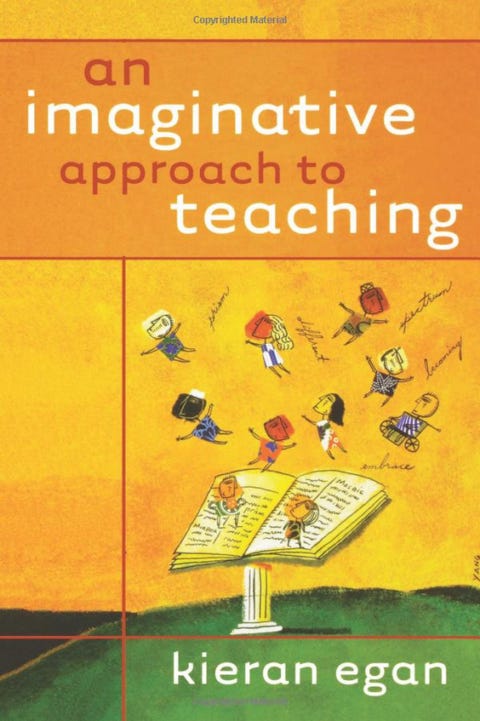
I recommend this book. That said: it’s not as bouncy as the next one…
C. You’re a parent or teacher helping kids learn to read good (and wanna help them learn other literary things good, too)
A mistake that schools make is to teach reading and writing as skills to be learned.
Imaginary Interlocutor: Wow, I mean, what else would they be?
They’re ways to connect to the story of the world. And in this book, Egan shares practical ways to help kids enter into that adventure, which help them fall in love with reading and writing:
Teaching Literacy: Engaging the Imagination of New Readers and Writers (2006)
Why do we have commas? Why does “Wednesday” put the “d” before the “n”? Why do we have spaces between words? The rules we memorize in class are actually elegant solutions to the problem of getting literacy into brains that most certainly were not evolved to it.
Don’t let the Tyrannosaurus on the cover fool you: the book goes on all the way to college-level literacy skills. This is, simply, Egan’s most practical book on teaching. (How wonderful it would have been to write more in this vein! I can imagine one on math, on science, on history…) If we ever do a reading group, this book’ll be on the list.
D. You like your ideas wrapped in a futuristic history with laser battles! and environmental disasters!
Can’t help you with the laser battles, but in
The Future of Education: Reimagining our Schools from the Ground Up (2008)
Egan asks, what might the story of schooling in the 21st century be like, if his ideas slowly spread? In the book’s second half, each chapter chronicles a decade of world history through the eyes of a teacher. (A favorite part — near the end, Egan addresses how he sees his approach intersecting with vocational education.)
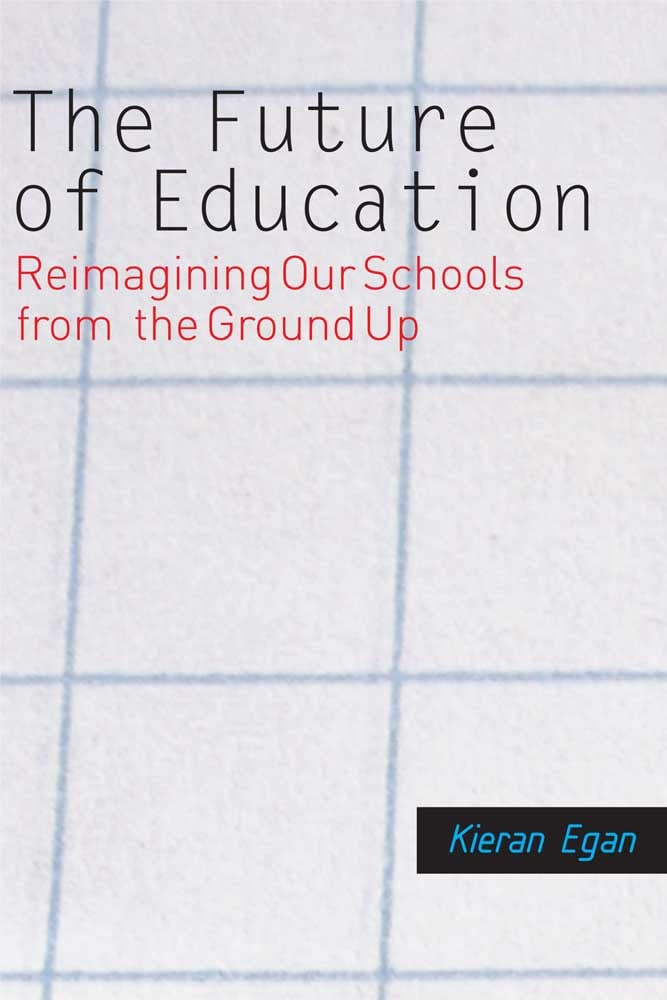
The best part of the book, though, is that Egan squeezes all five kinds of understanding — which he takes over 140 pages to explain in The Educated Mind — into a single chapter… and it basically makes sense.
E. You’re some snob who likes your histories to be about the actual past
I heartily recommend —
Getting it Wrong from the Beginning: Our Progressivist Inheritance from Herbert Spencer, John Dewey, and Jean Piaget (2002)
I first discovered Egan when I stumbled on this book at the University of Washington library. That evening, in my small Seattle apartment, I got so excited I had to consciously put the book away so I could fall asleep.
Egan is a third way in the educational wars — Progressivism vs. Traditionalism. If you’re already familiar with those, then this book is a great (and dare I say thrilling?) entry into his work. If you’re not already familiar with those…
…well, you definitely are, you just don’t know it. Because basically every “amazing new idea” in education that you’ve heard about over the last hundred years is just some microwaved Educational Progressivist leftover.2 And the simple truth is that, for a hundred years, these ideas have failed to achieve the results we keep hoping they will. In this book, Egan explains why that is.3
It doesn’t give his theory, but it clears the stage.
Side note: since this book picks a very definite fight, it attracted a lot of reviews: I recommend reading the ones listed at the end of the book’s Wikipedia page.
F. You liked Angela’s Ashes, but wish Frank McCourt had become a priest
At the age of 18, Egan left home to enter a Franciscan monastery. He didn’t stay long, but his experiences there — disenchanting, enchanting, and other — helped shape his picture of the world. He wrote up his experiences in an unpublished memoir titled
The Novitiate
— some chapters of which can be found on the CIRCE site. But if it’s personal history you’re going for, first you should set the stage and read his obituary. It’s smart and funny and moving; I only hope I get so good a review of my life after I’m done with it.
And finally…
G. You think theory is bunk and are looking for a classroom-ready program that could begin to change the world next week
First, you want too much. Second… Egan might have one?
“Learning in Depth”
This is the one piece by Egan that I wish everyone connected to education would read. “Learning in Depth” is a mirror image to his larger paradigm — where it’s complex, this is simple; where it knits together insights from across the humanities and social sciences, this is simple enough for a child to understand.
Best of all, while it draws on his larger theory (in fact it couldn’t work if his larger theory was bunk), it doesn’t require anyone understand that larger theory to put this into practice.
I.I.: Brandon, what is this “Learning in Depth”? It’s almost like you’re purposely not describing it.
Honestly, he describes it perfectly in the essay above — and at a scant 2,000 words or so, you can read it in a few minutes!
Mostly, I don’t want to screw it up here.
If you love the idea, and want to bring it into your classroom or homeschool, he unpacked the idea in a most practical way in the book Learning in Depth: A Simple Idea that Can Transform Schooling.
And I’ll say: from what I saw when I visited the world’s only Egan-fueled elementary school, that’s the rare overblown subtitle that actually seems able to live up to its promise.
(By the way, it’s my understanding that this is actually still in use in some schools around the world. If anyone knows of someone working at one of them, I’d love to talk with them!)
But after all that…
But maybe none of those describes you. Heck, maybe you’re sick of all these words, words, words, and you’re beginning to perseverate on how there’s a pile-up of dishes in the kitchen.
Wouldn’t it be nice if Egan himself laid out a some of his ideas in a YouTube video that you could just press “play” on, and listen?
There are actually quite a few videos of Egan presenting online; the best one might be this:
If anyone, actually, is interested in putting together a playlist of Egan videos, please feel free to post it in the comments!
And if you didn’t follow those references, my goodness do you have a fun fifty hours of reading in your future.
The exception to this are the educational ideas that are a re-serving of Educational Traditionalism.
“Ooh, political intrigue!” you may be thinking. Alas, no. The movement known as Educational Progressivism is only distantly related to the contemporary Progressive political movement. (A lot’s happened in a hundred years.)






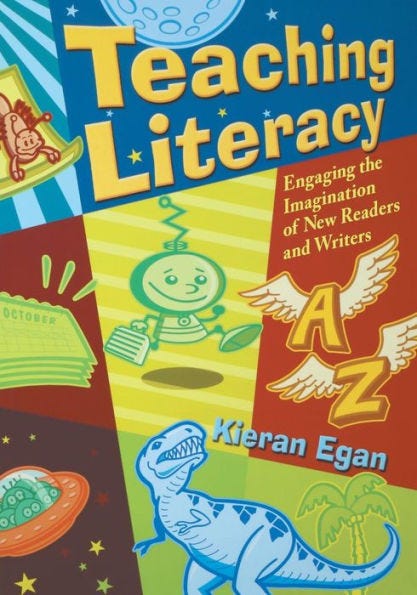
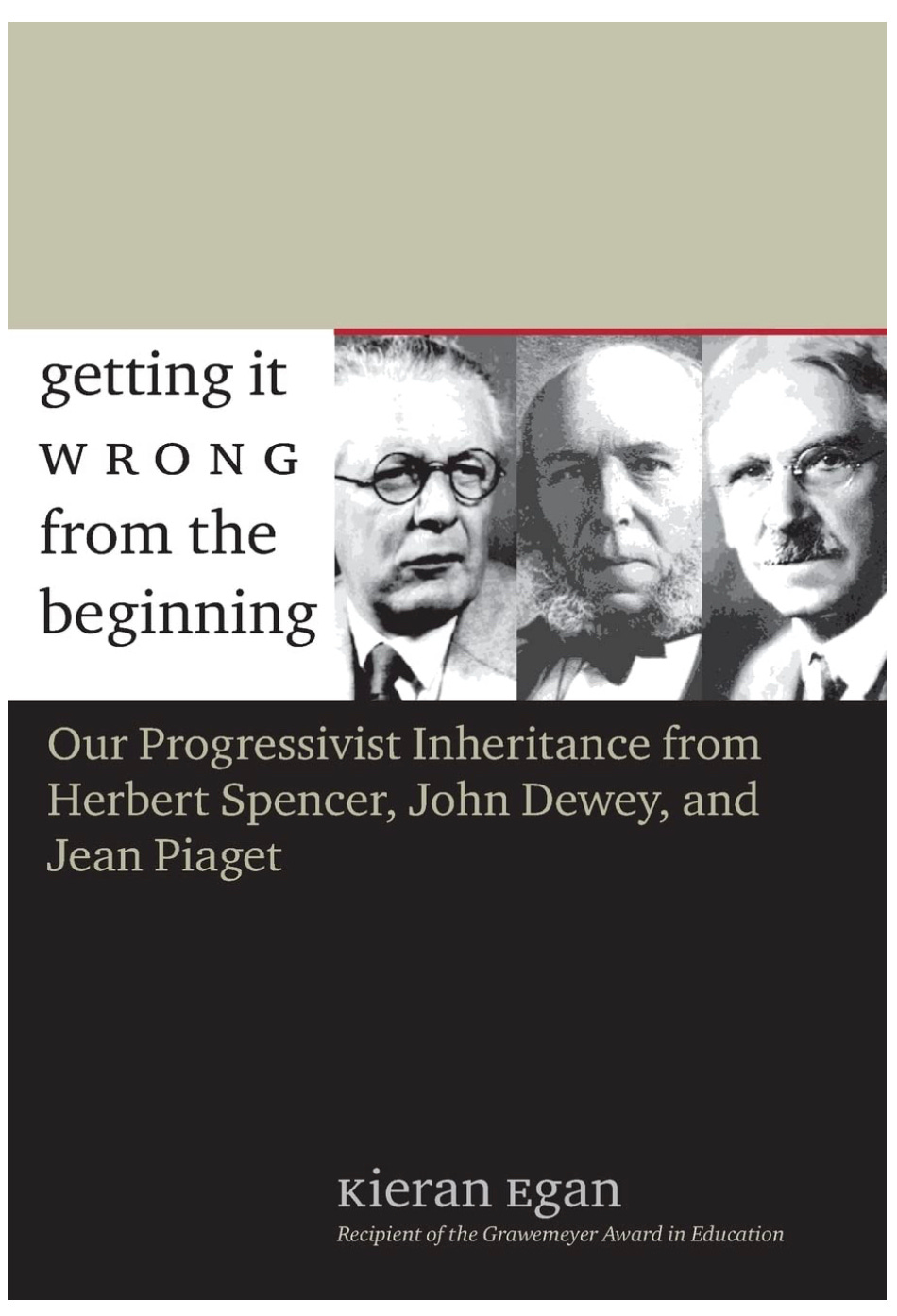
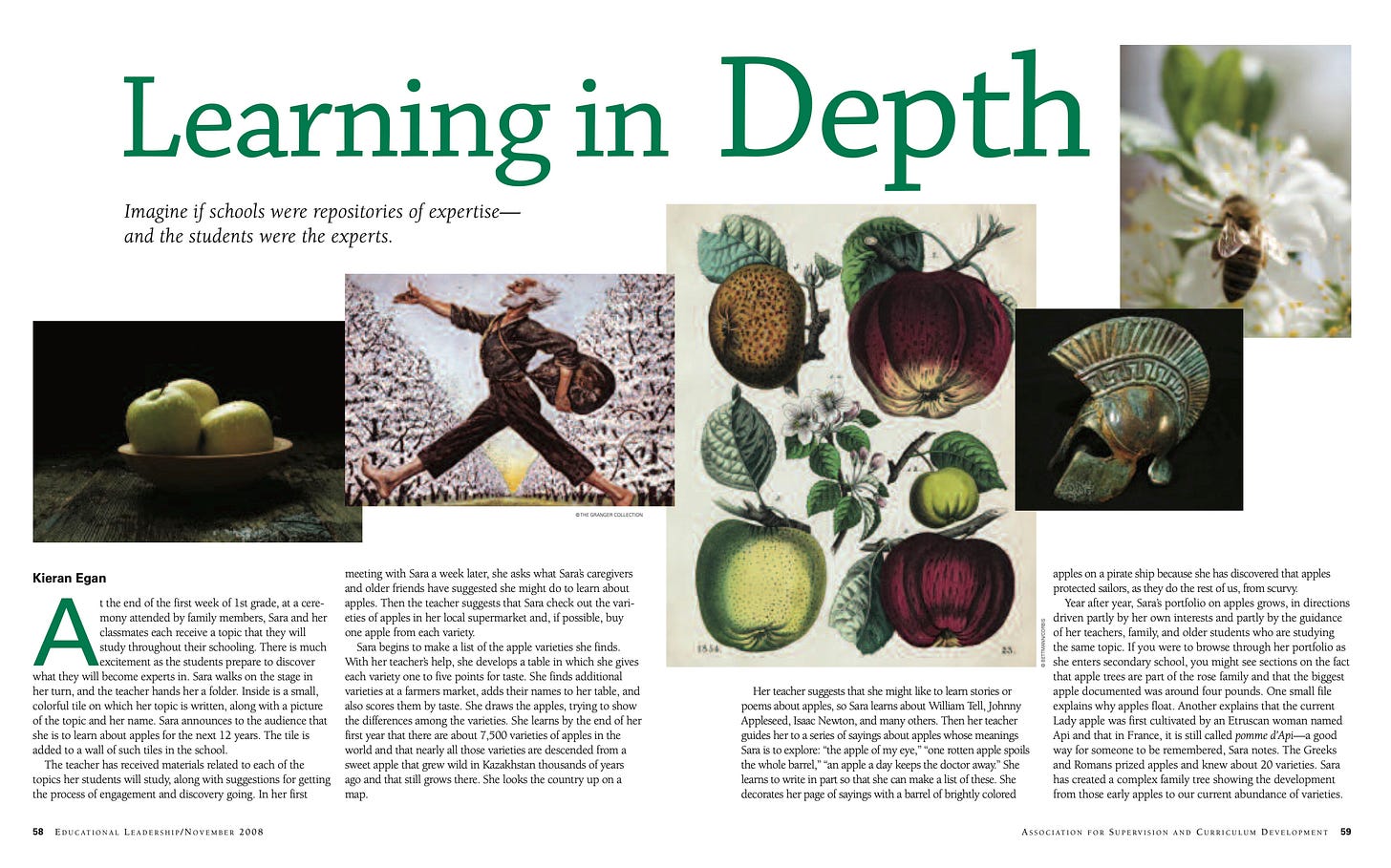

I just downloaded Learning in Depth, and it is the most revolutionary thing I've read about education in my whole life. Thank you for sharing this. I'm hooked, I'll move on to the books right away.
I have now read all of this substack, your ACX book review (and comments), Egan's The Future of Education, the Learning in Depth PDF and some of his posts on the ImaginED blog. I am naturally skeptical and have so many questions it could probably be it's own blog post but I'm going to try asking them inline here even though they are mostly not specifically about this post.